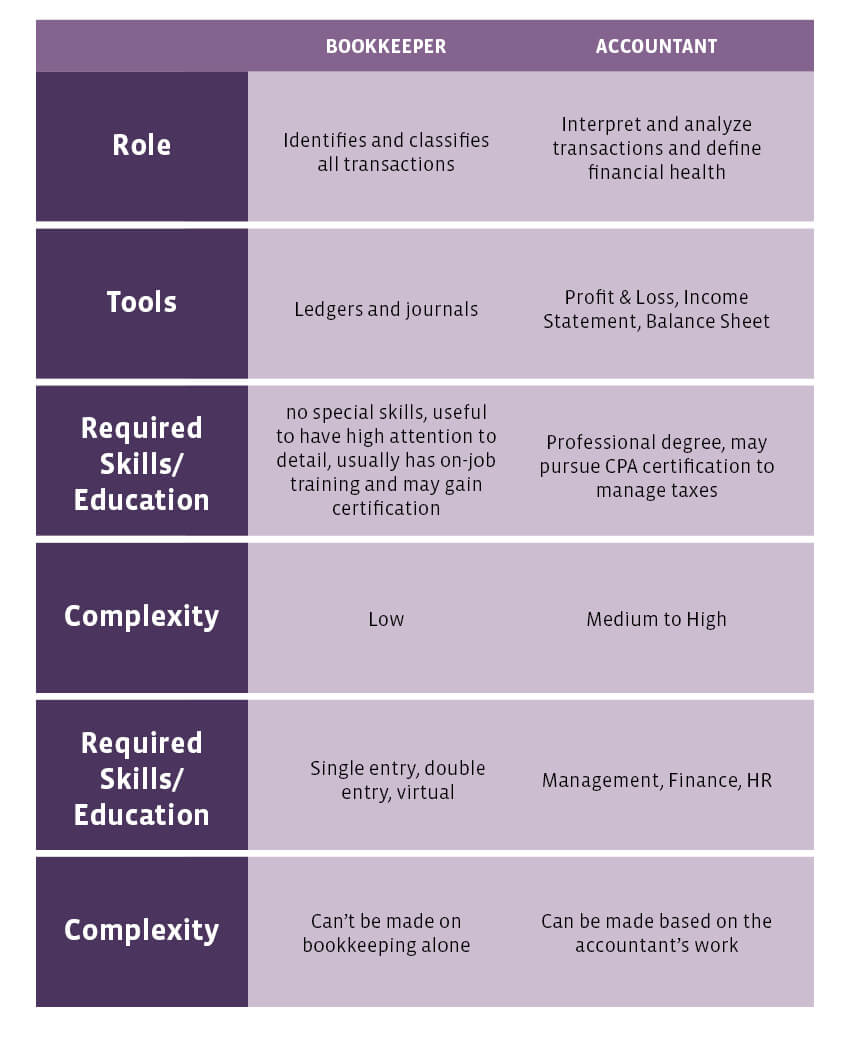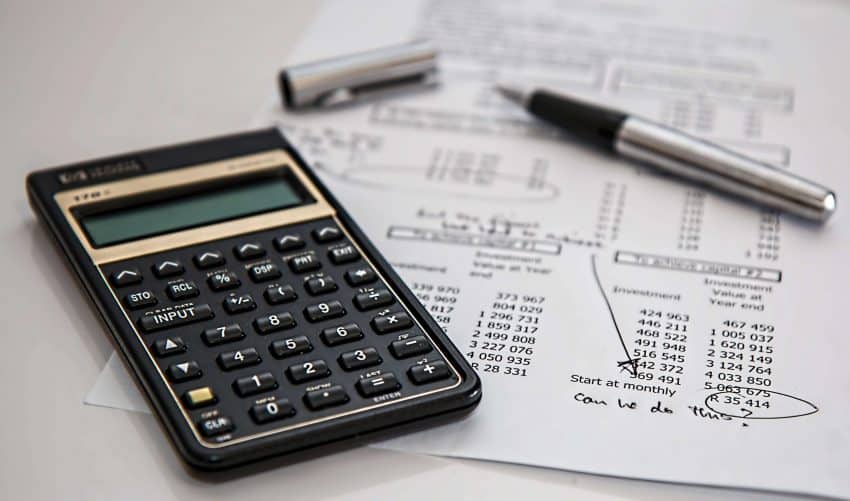Bookkeeper vs Accountant: What’s the Difference?
Updated: February 9, 2024
Published: April 24, 2020

Both bookkeepers and accountants play pivotal roles in businesses and for individuals. If you enjoy creating organizational frameworks, working with numbers, and helping to problem-solve, then a career in the finance field may be right for you. However, before choosing which career path to follow, you’ll want to look at the differences between the roles of bookkeeper vs. accountant to decide what is a better fit.
Let’s dive into what each role entails, key similarities and differences, as well as the educational requirements and job outlook.
Defining the Roles
The line between where a bookkeeper role ends and an accountant’s begins is not set in stone. However, the two either work closely together or one person can end up handling both.
- Bookkeeper: In a general sense, a bookkeeper keeps track of the day-to-day transactions in a business. They record bills paid, sales, payroll, and other expenditures.
- Accountant: To complete their work, an accountant relies on the work that has been done by a bookkeeper. As such, accountants review the financial records and statements to make interpretations and use analytics. Accountants are able to pull insights about the company’s overall health based on the statements provided by a bookkeeper.

Photo by Piotr Adamovics from Pexels
Activities of Bookkeeping and Accounting
Although it’s clear that the two roles rely on one another to function, there are key differences. Check out the following to get a better picture of their respective responsibilities.
Accountant
An accountant follows the standards of accounting in their given setting. They are in tune with regulations and must comply with internal and external guidelines. Accountants report the overall business’ finances and complete tasks, including:
- Financial transaction analysis
- Produce business records and statement summaries
- Interpret financial data
- Summarize overall performance
- Report financial positions of the company
- May assist in key decision-making based on data and analysis
Bookkeeper
A bookkeeper is responsible for record-keeping. This typically involves:
- Using software and spreadsheets to record transactions
- Receive and document checks, cash, and vouchers
- Create reports like balance sheets, income statements, and total balances
- Check reports of accuracy
- Reconcile differences they find in their reporting
The Function of Bookkeeping
The overall function of bookkeeping is to identify, classify, and record all transactions. The level of complexity of the position is not relatively high; however, it does require keen attention to detail. Bookkeepers don’t function alone to provide decisions. Yet, their work is crucial in providing accountants with the information they need to be able to do so.
The Function of Accounting
With the rise of technology and automation tools, the role of accountants is shifting. Accounting teams and CFOs are working more and more towards strategy, analysis, and decision-making for businesses. However, they also manage taxes for businesses and individuals. They work with statements like profit & loss, balance sheets, and income statements to provide an overview of financial health.
Why is Bookkeeping Important?
Businesses can only continue to run if they are making money. The first people to be able to recognize whether or not this is happening is a bookkeeper. As such, their role is very important to ensure that businesses are functioning properly.
Why is Accounting Important?
Accountants take information and data to the next step by prescribing the actions that should occur to maximize profit and minimize losses. Therefore, they are majorly responsible for dictating the success of a business. They are also responsible for sharing the financial information with internal and external stakeholders and government authorities. Every business needs an accountant — there is no way around this fact.
Bookkeeping vs. Accounting: How They Overlap
As you can see, the two roles have some similar features. Both positions provide strategic advice and information to their clients. A bookkeeper may assist in creating budgets for you, whereas an accountant will advise the best way to manage taxes and help advise what kind of corporation you should set up.
Required Education and Credentials
The truth is that education requirements vary for both bookkeepers and accountants. There are some cases in which a high school diploma will suffice for either position. The educational requirements are typically dictated by the hiring company.
With that being said, as time progresses, it is becoming increasingly the case that accountants hold at least a bachelor’s degree. In many cases, they also have a Master’s in Business Administration (MBA) or a Master of Accountancy.
Accountants generally have more education than bookkeepers, but it’s possible that you can get your foot in the door as a bookkeeper and end up working as an accountant. A certificate in accounting can be highly beneficial in navigating this career transition. Those who prove their knowledge, learn on the job or attend school while working as bookkeepers may progress into an accountancy role.
One way to work while earning an MBA or degree is to attend online college. For example, the University of the People has an MBA program that is tuition-free, flexible and entirely online. Therefore, if you want to start working in the field while progressing your education, this could be a good opportunity to get started!
Which Do You Need?
Most businesses rely on both types of professionals for smooth business functioning. Bookkeepers work on the front line, documenting daily transactions. Then that information is provided to the accounting team to pull insights and help with bigger picture considerations.
When Do You Need a Bookkeeper vs. Accountant vs. Controller vs. CFO
In the realm of accountancy and a business’ financial positions, there are additional roles that work alongside bookkeepers and accountants. These are the controller and CFO. We’ll take a brief look at these so that you have a better sense of the big picture.
The Role of Controller
Controllers manage the month-end closing. They take the outputs from accountants and deliver them to the appropriate stakeholders. Controllers are another stop-gap to make sure that reports are accurate.
The Role of CFO
The CFO oversees everything regarding the financial health of a business. They are responsible for seeing the long-term situation and aligning the company’s day-to-day operations to align with business goals.
Separation of Duties
All of these positions play an integral role in a business’ operations and financial structure. They are purposely separated so that there is a system of checks and balances.

Photo by Pixabay from Pexels
Job Outlook and the Shifting Landscape
Despite a setback at the hands of the Great Recession, financial roles are on the rebound. Through 2022, the field can expect to see a 13% growth rate.
Even with technology making its way into the field on a broad scale, humans are still needed for the high-skilled tasks and interpretation of information. The technology is helping to automate repetitive tasks, but businesses still rely heavily on analysis and decisions by individuals to maximize effectiveness.
Which Should You Become?
The choice between which career to choose is highly subjective.
If your goal is to move upwards within a company and have more power, then accounting will offer a better position to do so. If you want to start by testing the field, then bookkeeping is a good first step into the business of finance.
Both require working with numbers, but bookkeepers are much more closely working with numbers. On the other hand, accountants require more logic and problem-solving skills.
The Bottom Line
Here’s the bottom line (pun intended) — both bookkeepers and accountants provide important duties to the overall functioning of a business. Both small and large businesses may hire the two positions.
On one hand, if you are unsure of how far you want to progress in the finance industry, bookkeeping may be the role for you, at least for starters. If you generally enjoy data entry and have high attention to detail, then it could be the end point, too.
If you prefer to make inferences and provide solutions, then you should consider a role as an accountant. Regardless of which you choose to become, you will undoubtedly make a difference in the businesses you work with and serve a crucial and in-demand role.



